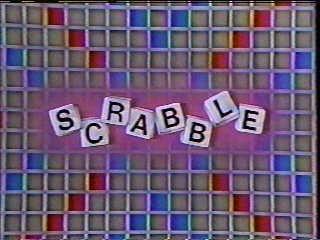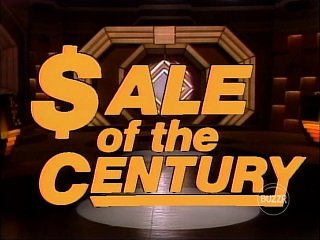
Scrabble is an American television game show based upon the board game Scrabble. Contestants competed in a series of rounds to fill in words within a crossword puzzle for cash. Muriel Green of Exposure Unlimited developed the idea for a television game show based upon the board game concept. During 1983, Green convinced Selchow and Righter, who at that time owned the Scrabble board game, to license Exposure Unlimited to produce the game show. Exposure Unlimited co-produced the show with Reg Grundy Productions, and licensed the show to NBC. Scrabble aired on NBC from July 2, 1984, to March 23, 1990, and again from January 18 to June 11, 1993. Chuck Woolery hosted the program. Jay Stewart was the announcer for the first year. Charlie Tuna replaced him in the mid-1985 and remained through the original run and the entirety of the 1993 revival.

Password is an American television game show in which two teams, each composed of a celebrity player and a contestant, attempt to convey mystery words to each other using only single-word clues, in order to win cash prizes.

Sale of the Century is an American television game show that originally debuted on September 29, 1969, on NBC daytime. It was one of three NBC game shows to premiere on that date, the other two being the short-lived game shows Letters to Laugh-In and Name Droppers. The series aired until July 13, 1973, and a weekly syndicated series began that fall and ran for one season.

Lingo is an American television game show with multiple international adaptations. In it, contestants compete to decode five-letter words given the first letter, similarly to Jotto, with each correctly guessed word earning number draws to attempt filling in a Bingo card.

Double Dare is an American television game show, produced by Mark Goodson & Bill Todman, that ran from 1976 to 1977 on CBS. The main game pitted two contestants in isolation booths attempting to correctly identify a person, place, or thing based on one-sentence clues. The bonus round then pitted the champion of the main game against a panel of three Ph.Ds, referred to as the "Spoilers". Alex Trebek was the host, with Johnny Olson and later Gene Wood announcing. The show was created by Jay Wolpert.
Concentration is an American television game show based on the children's memory game of the same name. It was created by Jack Barry and Dan Enright. The show featured contestants matching prizes represented by spaces on a game board, which would then reveal portions of a rebus puzzle underneath for the contestants to solve.

Now You See It is an American television game show created by Frank Wayne for Mark Goodson-Bill Todman Productions. The object of Now You See It is to answer general knowledge trivia questions by finding the answers hidden in a grid, similar to a word search puzzle.

Chain Reaction is an American television game show created by Bob Stewart, in which players compete to form chains composed of two-word phrases.

Jackpot is an American and Canadian television game show produced by Bob Stewart which saw contestants attempting to solve riddles in order to win cash and prizes.

Whew! is an American television game show that aired on CBS from April 23, 1979, until May 30, 1980. It was hosted by Tom Kennedy and announced by Rod Roddy. Gameplay features contestants correcting "bloopers", factual statements in which one word has been changed.

Body Language is an American game show produced by Mark Goodson Productions. The show aired on CBS from June 4, 1984, until January 3, 1986, and was hosted by Tom Kennedy. Johnny Olson announced until his death in October 1985; Gene Wood and Bob Hilton shared the announcing duties afterward, having substituted on occasion before then.

Child's Play is an American television game show in which adult contestants tried to guess words based on definitions given by children. The Mark Goodson-produced series debuted on CBS on September 20, 1982 and ended on September 16, 1983.
Time Machine is an American game show where contestants compete to answer trivia questions about popular culture and recent history to win prizes. The show aired on NBC from January 7 through April 26, 1985, and was hosted by John Davidson. Charlie Tuna was the announcer, with Rich Jeffries as his substitute. Reg Grundy Productions produced the series, and upon its premiere Time Machine was one of three Grundy series airing on NBC.

Caesars Challenge is an American game show that aired on NBC from June 14, 1993, to January 14, 1994, and was recorded at the Circus Maximus Theatre of Caesars Palace in Las Vegas, Nevada. Ahmad Rashad hosted the series and, in keeping with the theme of the show's location, he was assisted by a man dressed as a Roman gladiator. Dan Doherty played the role for most of the show's run, with Chad Brown and Zach Ruby handling the earliest episodes before Doherty joined the show.

All-Star Blitz is an American game show that aired on ABC from April 8 to December 20, 1985, with reruns airing on the USA Network from March 31 to December 26, 1986. Peter Marshall was the host and John Harlan was the announcer for the series, which was produced by Merrill Heatter Productions, in association with Peter Marshall Enterprises.

The Price Is Right is an American game show produced by Mark Goodson-Bill Todman Productions, wherein contestants placed successive bids on merchandise prizes with the goal of bidding closest to each prize's actual retail price without surpassing it. The show was a precursor to the current and best-known version of the program, which premiered in 1972 on CBS's daytime schedule. It makes The Price Is Right one of only a few game show franchises to have aired in some form across all three of the Big Three television networks.

Showoffs is an American television game show which ran on ABC from June 30 to December 26, 1975. Bobby Van was host, with Gene Wood as announcer. The Mark Goodson-Bill Todman production involved two teams competing in a game of charades.

Password Plus and Super Password are American TV game shows that aired separately between 1979 and 1989. Both shows were revivals of Password, which originally ran from 1961 to 1975 in various incarnations. With only subtle differences between them, both Password Plus and Super Password retained the format of play as their predecessor, with two teams of two people each—a celebrity and a contestant—attempting to guess a mystery word using only one-word clues. A new feature included a series of five passwords as clues to an overarching puzzle for the teams to solve.

Blockbusters is an American game show, created by Steve Ryan for Mark Goodson-Bill Todman Productions, which had two separate runs in the 1980s. On this program, contestants answered general-knowledge questions to complete a path across or down a game board composed of hexagons. The first series of the show debuted on NBC on October 27, 1980, and aired until April 23, 1982. In the first series, a team of two family members competed against a solo contestant. Blockbusters was revived on NBC from January 5 to May 1, 1987, but featured only two solo contestants competing.
Call My Bluff was an American game show from Mark Goodson-Bill Todman Productions that aired on NBC daytime from March 29 to September 24, 1965. Bill Leyden was emcee, with Johnny Olson, Don Pardo and Wayne Howell as announcers.

















